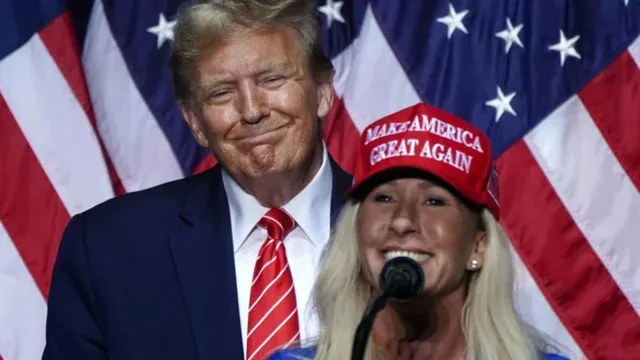- By Supratik Das
- Fri, 14 Nov 2025 06:30 PM (IST)
- Source:JND
A fresh wave of concern has swept through India’s tech and student communities after US Republican Congresswoman Marjorie Taylor Greene said she would soon introduce a bill to eliminate the H-1B visa programme. The proposal, if tabled and passed, could dramatically reshape the future of thousands of Indian professionals who rely on the visa as a pathway to long-term US employment and, eventually, permanent residency.
What Greene Has Proposed
In a post on X, Greene accused major US industries, especially Big Tech, AI companies, and hospitals of using the H-1B system to undermine American workers. Calling it “corrupt”, she said her legislation aims to abolish the programme entirely, except for a capped quota of 10,000 annual visas for doctors and nurses, which too would be phased out over the next decade.
Greene argued that US sectors such as technology, healthcare, engineering and manufacturing had become “dependent” on imported talent and that eliminating the visa would “put Americans first”.
🚨I am introducing a bill to END the mass replacement of American workers by aggressively phasing out the H1B program.
— Rep. Marjorie Taylor Greene🇺🇸 (@RepMTG) November 13, 2025
Big Tech, AI giants, hospitals, and industries across the board have abused the H-1B system to cut out our own people.
Americans are the most talented people… pic.twitter.com/m73Wp1MMiw
Why Indian Professionals Are Most Exposed
Indians account for over 70 per cent of all H-1B visas, a pattern unchanged for years. For decades, the visa has been a backbone for Indian software engineers, doctors, researchers, and STEM graduates seeking opportunities in the US. A large share of Indian-origin doctors in America, estimated at around 6 per cent of the US physician workforce, work on H-1B visas.
In tech, the reliance is even higher. Industry data shows that upwards of 80 per cent of computer-related H-1B roles have historically gone to Indian nationals. Greene’s plan, therefore, threatens not just future applicants but long-term industry pipelines built between India’s IT sector and US employers.
India’s USD 283-billion IT industry, heavily dependent on US contracts, may face immediate pressure. Companies like TCS, Infosys, and Wipro have already begun hiring more locally in the US, but a full elimination of the H-1B programme could force firms to shift more work offshore, adjust pricing or reduce onshore presence.
Impact On Students And Future Applicants
For Indian students hoping to transition from US universities to full-time roles, the proposal is especially alarming. The H-1B visa has remained the most reliable path for international STEM graduates to stay and work in the US after completing their degrees. Removing it would reduce post-study options and could push students toward Canada, the UK, Australia, and Europe.
Universities in the US, which depend heavily on international STEM enrolments, may also feel the ripple effect if students perceive shrinking job prospects.
ALSO READ: 'Train Americans, Go Home': Trump's Top Official's Bizarre Stand On New H-1B Visa Policy
Greene’s announcement comes shortly after President Donald Trump surprised many by defending the H-1B programme, saying the US lacks enough domestic talent for certain high-skill sectors, especially in defence and advanced technology.

